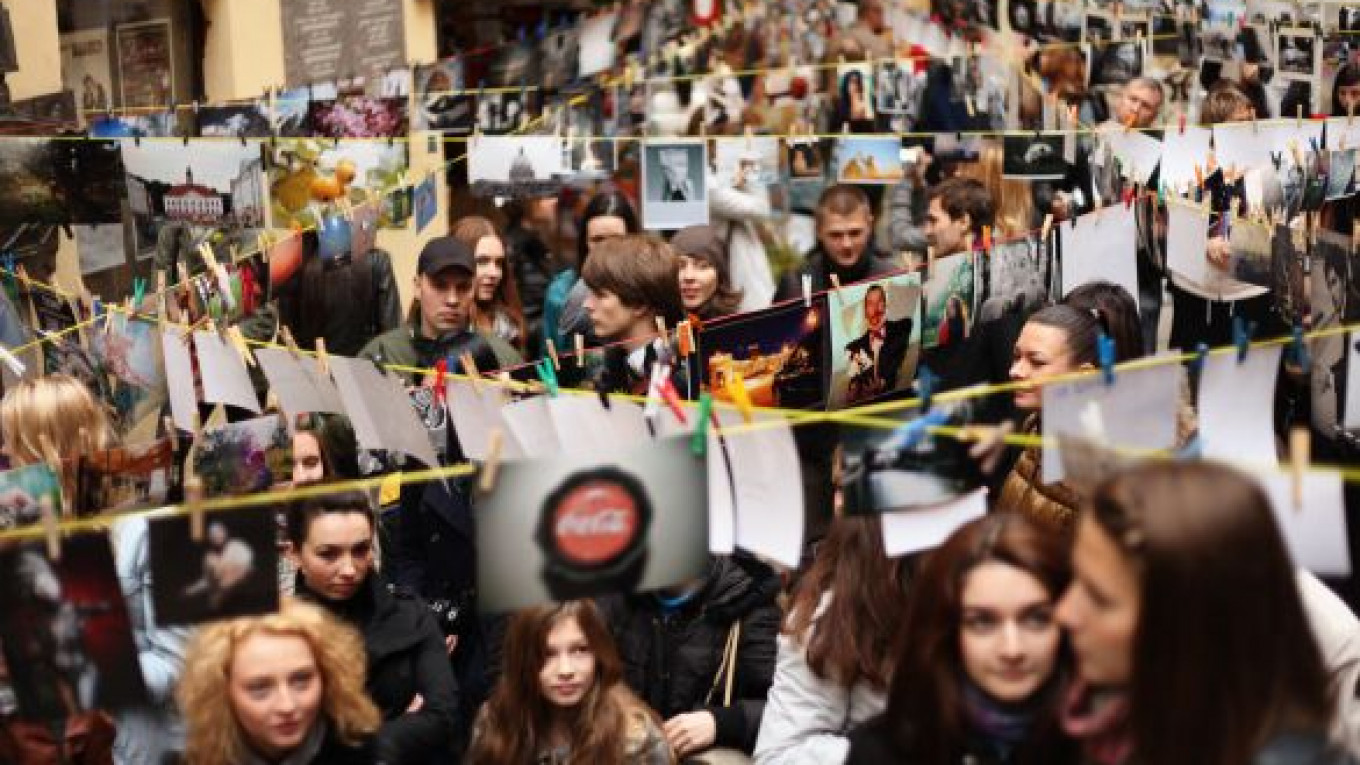The rules of Sushka (pronounced "Sooshka") are simple. Bring your photographs to the appointed place. Hang them up on the clothes lines that you find there. Stroll around, enjoy other people's work. And take home whatever you like.
A simple idea, and infectious. It was two years on Sunday since the first photos were hung out on a rainy, gusty spring day in St. Petersburg. Since then, Sushka, or in English "Photo Laundry," has popped up in over a hundred cities across Russia and abroad, involving more than 40,000 participants worldwide according to organizers.
"Photographers are multiplying like rabbits and there is no outlet for them other then the Internet … in Russia it is practically impossible to exhibit your work," creator Andrei Kezzin told The Moscow Times.
Kezzin, a photographer and teacher at the St. Petersburg Academy of Photography, wanted to provide a space for beginner photographers that would bypass the curatorial selections typical of art exhibitions.
"And so I had the idea to hold an exhibition that would be open to everyone … and where the people who selected the work would be the photographers themselves," Kezzin said. He approached the Academy with the concept, and in 2011, with the help of administrator Olya Luvetau, the project launched.
When the third St. Petersburg Sushka attracted over a thousand people in two days, they knew they'd tapped into something.
According to Luvetau, the appeal of Sushka remains goes beyond just the opportunity for exhibition. "We make people get away from their monitors, go outside, and print their photographs!" she said.
"At Sushka, everyone is equal," Luvetau added, playfully terming this state "photodemocracy."
Kezzin believes that this democratic atmosphere allows participants to regain their honesty as viewers and photographers, reinvigorating professionals as well as beginners. "You don't bring your work to Sushka, you bring what you like," he explained. "Maybe you photograph naked girls, but you bring flowers."
The Russian name encapsulates this material, honest character. "Sushka" can mean the process of drying photographic prints, but also that of drying laundry on a line. The same word also describes a humble and quintessentially Russian snack resembling a small circular pretzel.
As Sushka expands, Kezzin and Luvetau have had to organize to protect the project's ethos. Would-be organizers must declare their intentions, link their event to the main VKontakte or Facebook page, and observe the project's basic format and tenets.
Because some institutions have previously attempted to use Sushka as a PR instrument, the organizers now ask that the events be held in cultural rather than commercial spaces.
Sushka itself remains completely non-profit, aided by a loyal Internet following that helps keep organizers abreast of local infringements. But due to its sudden growth, organizers are now approaching a crossroads. While spontaneity and openness are central to the project's identity, protecting and nurturing the idea might also require a website, trademark, support team, and the funding that these require. They will soon have to decide whether to incorporate Sushka or leave it in its current form.
One thing, though, is certain. While Sushka might negotiate with sponsors in the future, it will never charge admission. "Otherwise it would be an ordinary exhibition, and not a Sushka," Luvetau said.
This year's Moscow season opened with a lively event on Vozdvizhenka in mid-April. Some participants, such as amateur photographer Andrew Demin, were interested in the event's social possibilities. "Maybe I can make some good contacts," Demin said as he pinned his muted cityscape to the line.
Others were more interested in romantic connection, as the numerous alluring portraits of young women, complete with contact information, attested.
Still others were drawn by the Sushka philosophy, such as Kirill Mesmer, whose deep-blue cyanotype prints proved especially popular with the crowd.
"(Events like Sushka) help us feel photography," he said. "Our proximity to the photograph, it's size, format, surface (gloss or matte) help us understand the photo better."
It is as if the social media that has fueled Sushka from the beginning overspills its bounds at these events, bringing strangers and their sundry desires together in real time and space and leaving them, finally, with a lasting physical connection in the photographs that they exchange.
Muscovites can experience Sushka for themselves this coming weekend. There are no less than three events scheduled on Saturday: one in Moscow (a family-themed Sushka at the Moscow Estate of Ded Moroz, 168D Volgograd Prospekt), and two more in nearby Troitsk and Sergiyev Posad, with many more to come later in the summer.
For more information, see the main Russian-language site at , or the English-language page at .
Contact the author at [email protected]
Related articles:
A Message from The Moscow Times:
Dear readers,
We are facing unprecedented challenges. Russia's Prosecutor General's Office has designated The Moscow Times as an "undesirable" organization, criminalizing our work and putting our staff at risk of prosecution. This follows our earlier unjust labeling as a "foreign agent."
These actions are direct attempts to silence independent journalism in Russia. The authorities claim our work "discredits the decisions of the Russian leadership." We see things differently: we strive to provide accurate, unbiased reporting on Russia.
We, the journalists of The Moscow Times, refuse to be silenced. But to continue our work, we need your help.
Your support, no matter how small, makes a world of difference. If you can, please support us monthly starting from just $2. It's quick to set up, and every contribution makes a significant impact.
By supporting The Moscow Times, you're defending open, independent journalism in the face of repression. Thank you for standing with us.
Remind me later.






